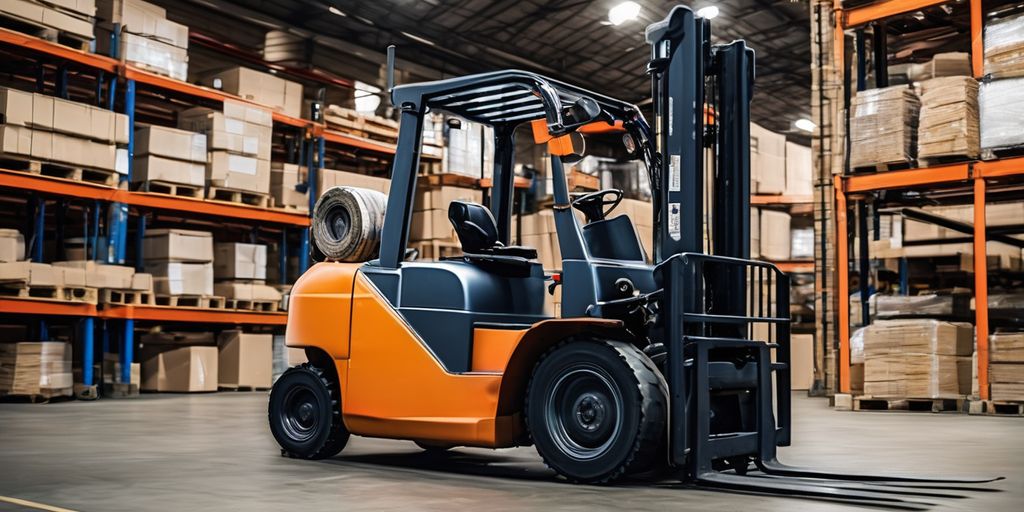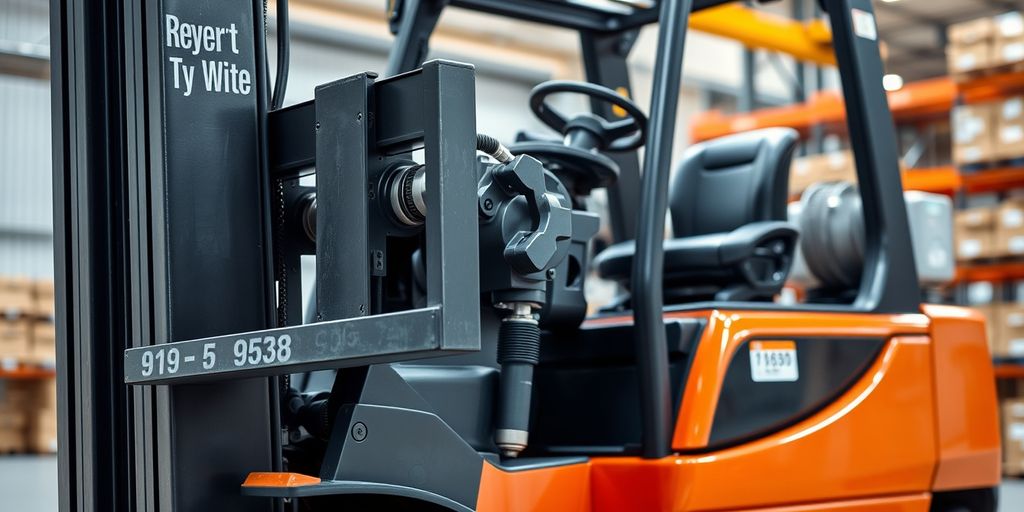Certificación de montacargas: lo que necesita saber — overview
Operar un montacargas no se trata sólo de mover cargas pesadas. Es una habilidad que requiere capacitación y certificación adecuadas para garantizar la seguridad y la eficiencia en el lugar de trabajo. Este artículo lo guiará a través de los conceptos básicos de la certificación de montacargas, desde su importancia hasta los pasos necesarios para obtener la certificación.
Conclusiones clave
- La certificación de montacargas ayuda a reducir los accidentes laborales y garantiza el cumplimiento legal.
- Para obtener la certificación, debe cumplir con los requisitos básicos, completar la capacitación y aprobar un examen.
- La capacitación para la certificación incluye instrucción formal, capacitación práctica y evaluación del desempeño.
- Existen diferentes tipos de certificaciones para distintas clases de montacargas y deben renovarse periódicamente.
- Puede encontrar programas de certificación a través de empleadores, proveedores externos u opciones en línea.
Por qué la certificación de montacargas es esencial

Reducción de Accidentes Laborales
La certificación de montacargas es fundamental para reducir los accidentes laborales. Muchos accidentes ocurren porque los operadores son descuidados o no saben cómo utilizar sus equipos correctamente. La certificación garantiza que los operadores estén capacitados para comprender los riesgos y peligros de usar un montacargas. Los estudios muestran que las empresas con programas de capacitación adecuados e inspecciones diarias previas a los turnos tienen menos accidentes, menos tiempo de inactividad y menores costos.
Requisitos Legales y Cumplimiento
Todos los operadores de montacargas deben estar certificados por ley. La Administración de Salud y Seguridad Ocupacional (OSHA) requiere una certificación antes de que alguien pueda operar un montacargas. Esta regla ayuda a reducir las lesiones por el uso inseguro de montacargas. La certificación también puede ayudar a los empleadores al reducir los costos de seguro y reducir los daños a los montacargas y a la propiedad.
Mejorando la Eficiencia Operativa
Los operadores de montacargas certificados pueden ayudar a mejorar la eficiencia de una empresa. Una capacitación adecuada ayuda a los operadores a comprender mejor sus equipos, lo que puede generar menos errores y menos tiempo de inactividad. Esto significa que las empresas pueden funcionar mejor y ahorrar dinero a largo plazo.
La certificación de montacargas no se trata sólo de cumplir la ley; se trata de crear un lugar de trabajo más seguro y eficiente.
Pasos para obtener la certificación de montacargas
Cumpliendo con los Requisitos Básicos
Antes de comenzar, asegúrese de cumplir con los requisitos básicos. Debe tener al menos 18 años, tener buena visión y ser físicamente capaz de operar un montacargas de manera segura. EE.UU. También se requiere ciudadanía o presencia legal.
Inscribiéndose en la Capacitación de Certificación
Una vez que cumpla con los requisitos básicos, el siguiente paso es inscribirse en un programa de capacitación para certificación. Esta capacitación cubre los principios de la operación segura de montacargas, los tipos de montacargas utilizados en el lugar de trabajo y los requisitos generales de seguridad. La capacitación puede ser brindada por varias organizaciones, incluidos empleadores, sindicatos y proveedores de capacitación especializados.
Aprobando el Examen de Certificación
Después de completar la capacitación, deberá aprobar un examen de certificación. El examen generalmente incluye componentes escritos y prácticos. Debe obtener al menos un 70 % en la prueba escrita y demostrar sus habilidades en una evaluación práctica .
Recibiendo Capacitación Práctica
Finalmente, deberá recibir capacitación práctica de su empleador. Esta capacitación implica operar un montacargas bajo supervisión y completar una evaluación de su desempeño. Una vez que pase esta evaluación, estará certificado oficialmente para operar un montacargas.
Recuerde, comprender las regulaciones de OSHA para operaciones de montacargas es crucial tanto para la seguridad como para el cumplimiento.
Componentes de la capacitación para la certificación de montacargas

Instrucción Formal
La instrucción formal es el primer paso en la capacitación para la certificación de montacargas. Esta parte de la capacitación cubre los aspectos teóricos del funcionamiento de un montacargas . Incluye aprendizaje en el aula o cursos en línea que enseñan los conceptos básicos de la operación de montacargas, los protocolos de seguridad y las regulaciones de OSHA. Los temas que se suelen cubrir incluyen los diferentes tipos de montacargas, sus usos y la importancia de la estabilidad de los montacargas.
Formación Práctica
La capacitación práctica es donde obtienes experiencia práctica . Esta parte de la capacitación te permite practicar el manejo de una carretilla elevadora bajo la supervisión de un instructor calificado. Aprenderás a inspeccionar la carretilla elevadora, recoger y transportar cargas y realizar otras tareas esenciales. Esta experiencia práctica es crucial para comprender las aplicaciones del mundo real de lo que has aprendido en el aula.
Evaluación del Desempeño
El componente final es la evaluación del desempeño. En esta etapa, se evalúan sus habilidades para garantizar que pueda operar un montacargas de manera segura y eficiente. La evaluación suele incluir una serie de tareas como inspecciones de montacargas, recogida y descarga de cargas y estacionamiento. Aprobar esta evaluación es obligatorio para recibir su certificación de montacargas.
Diferentes tipos de certificaciones de montacargas

Montacargas de Clase I a Clase VII
Las certificaciones de montacargas se clasifican según el tipo de montacargas. Estas clases van desde la Clase I hasta la Clase VII, y cada una cubre diferentes tipos de montacargas:
- Clase I: Camiones con motor eléctrico
- Clase II: Carretillas para pasillos estrechos con motor eléctrico
- Clase III: Carretillas de mano con motor eléctrico o carretillas de mano/con conductor
- Clase IV: Camiones con motor de combustión interna (neumáticos macizos/amortiguados)
- Clase V: Camiones con motor de combustión interna (neumáticos)
- Clase VI: Tractores con motores eléctricos y de combustión interna
- Clase VII: Carretillas elevadoras todo terreno
Certificaciones Especializadas
Además de las clases estándar, existen certificaciones especializadas para tipos únicos de montacargas o industrias específicas. Estas pueden incluir certificaciones para operar transpaletas , manipuladores telescópicos u otros equipos especializados. Los empleadores deben asegurarse de que los operadores estén capacitados para el equipo específico que utilizarán.
Cursos de Renovación y Actualización
Las certificaciones de montacargas no son permanentes. Los operadores deben renovar su certificación periódicamente, normalmente cada tres años. También se requieren cursos de actualización si un operador ha estado involucrado en un accidente, ha observado una conducción insegura o ha sido asignado a un tipo diferente de montacargas. Mantenerse al día con estos requisitos garantiza que los operadores sigan siendo competentes y seguros en sus funciones.
Encontrar programas de certificación de montacargas
Capacitación Proporcionada por el Empleador
Muchas empresas ofrecen capacitación proporcionada por el empleador para garantizar que sus trabajadores estén debidamente certificados. Este tipo de formación suele adaptarse a las necesidades y equipos específicos del lugar de trabajo. Puede ser una opción conveniente ya que permite a los empleados capacitarse sobre los montacargas reales que utilizarán.
Proveedores de Capacitación de Terceros
Los proveedores de capacitación externos ofrecen programas integrales de certificación de montacargas. Estos proveedores suelen conocer bien los requisitos de OSHA y pueden ofrecer capacitación tanto presencial como práctica. Algunos proveedores externos populares incluyen:
- La Fundación Nacional de Carretillas Elevadoras
- Colegios comunitarios locales
- Escuelas de oficios
Opciones de Certificación en Línea
Para quienes prefieren la flexibilidad, existen opciones de certificación en línea . Estos programas le permiten completar la parte de instrucción formal de la capacitación a su propio ritmo. Algunos beneficios de la certificación en línea incluyen:
- cursos 100% en línea
- Narración de audio incluida
- Descuentos por volumen disponibles
Los cursos en línea son una excelente manera de comenzar, pero recuerde que OSHA requiere capacitación práctica y una evaluación de desempeño para completar su certificación.
Encontrar el programa de certificación de montacargas adecuado es crucial para desarrollar una fuerza laboral calificada y garantizar la seguridad en el lugar de trabajo.
Mantenimiento de su certificación de montacargas
Período de validez de la certificación
Su certificación de montacargas es válida por tres años . Es importante realizar un seguimiento de este período para asegurarse de seguir cumpliendo con las normas de OSHA. A medida que se acerca la fecha de vencimiento, debe planificar completar los pasos necesarios para la renovación.
Requisitos de Capacitación de Refresco
Para mantener su certificación, debe realizar una capacitación de actualización al menos cada tres años. Esta capacitación le ayuda a mantenerse actualizado sobre las prácticas de seguridad y los procedimientos operativos. También pueden requerirse cursos de actualización si se ve involucrado en un accidente o si su empleador detecta prácticas inseguras.
Registro y Documentación
El mantenimiento de registros adecuados es esencial para mantener su certificación. Los empleadores deben mantener registros detallados de su estado de capacitación y certificación. Esto incluye las fechas de su certificación inicial, cursos de actualización y evaluaciones. Mantener estos registros actualizados garantiza que siempre cumpla con los requisitos de OSHA.
Mantenerse al día con su certificación de montacargas no solo lo mantiene cumpliendo con las regulaciones sino que también garantiza un lugar de trabajo más seguro para todos.
Preguntas comunes sobre la certificación de montacargas
Requisitos de Edad y Salud
Para obtener la certificación de montacargas, debes tener al menos 18 años. No hay límite de edad máxima. La ley federal prohíbe a cualquier menor de 18 años operar un montacargas. Además, los operadores deben gozar de buena salud, ya que deben soportar las demandas físicas del trabajo.
Costos Involucrados
El costo de obtener la certificación para montacargas puede variar. Por lo general, oscila entre $50 y $200. Esta tarifa suele incluir tanto la capacitación como el examen de certificación . Algunos empleadores pueden cubrir estos costos para sus empleados.
Sanciones por incumplimiento
Operar un montacargas sin la certificación adecuada puede tener consecuencias graves. Los empleadores pueden enfrentar multas elevadas y la empresa puede ser considerada responsable de cualquier accidente o lesión. Garantizar que todos los operadores de montacargas estén certificados es crucial para la seguridad en el lugar de trabajo y el cumplimiento legal.
Es esencial abordar estas preguntas frecuentes sobre la licencia de montacargas para garantizar tanto la seguridad como el cumplimiento en el lugar de trabajo.
Conclusión
Obtener la certificación de montacargas no es sólo un requisito legal sino también un paso crucial para garantizar la seguridad en el lugar de trabajo. Al completar la capacitación necesaria y obtener la certificación, los operadores pueden reducir significativamente el riesgo de accidentes y lesiones. Los empleadores también se benefician, ya que una fuerza laboral bien capacitada puede generar menos incidentes, menores costos de seguros y una mayor productividad. Si usted es un empleador que busca certificar a su equipo o un individuo que desea mejorar sus habilidades, comprender el proceso de certificación es esencial. Recuerde, la seguridad y el cumplimiento van de la mano, e invertir en la capacitación adecuada es una medida inteligente para todos los involucrados.
Preguntas frecuentes
¿Por qué es necesaria la certificación de montacargas?
La certificación de montacargas es crucial para garantizar que los operadores estén capacitados para manejar el equipo de manera segura. Esto reduce la posibilidad de accidentes y lesiones en el trabajo. También es un requisito de OSHA, la Administración de Salud y Seguridad Ocupacional.
¿Cómo puedo obtener la certificación de montacargas?
Para obtener la certificación de montacargas, es necesario cumplir con requisitos básicos, como tener al menos 18 años. Luego, debe inscribirse en un programa de capacitación para certificación, aprobar un examen escrito y completar una capacitación práctica.
¿Existen diferentes certificaciones para diferentes tipos de montacargas?
Sí, existen varias certificaciones para diferentes clases de montacargas, desde la Clase I hasta la Clase VII. Cada clase pertenece a diferentes tipos de montacargas, como carretillas elevadoras con motor eléctrico y carretillas elevadoras para terrenos difíciles.
¿Cuánto tiempo es válida una certificación de montacargas?
Una certificación de montacargas suele tener una validez de tres años. Después de eso, deberá realizar una capacitación de actualización y aprobar una evaluación para renovar su certificación.
¿Puedo obtener la certificación de montacargas en línea?
Puede completar la parte de instrucción formal de la certificación en línea. Sin embargo, OSHA exige que la capacitación práctica y la evaluación del desempeño se realicen en persona.
¿Cuáles son las sanciones por no tener certificación de montacargas?
Operar un montacargas sin la certificación adecuada puede generar fuertes multas y sanciones por parte de OSHA. También aumenta el riesgo de accidentes laborales, que pueden provocar lesiones o incluso muertes.




Deja un comentario
Este sitio está protegido por hCaptcha y se aplican la Política de privacidad de hCaptcha y los Términos del servicio.